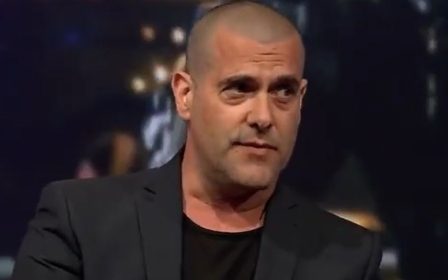UK rights groups to boycott Prevent review over Shawcross appointment

Leading human rights and civil liberties organisations in the UK are to boycott a long-delayed review of Prevent, accusing the government of using the process to try to “whitewash” its controversial counter-terrorism strategy.
In a joint statement on Tuesday, 17 organisations, including Amnesty International, Liberty and the Open Society Justice Initiative, said last month's appointment of William Shawcross as reviewer had “made clear, beyond doubt, that the UK government has no interest in conducting an objective and impartial review of the strategy, nor in engaging meaningfully with communities affected by it”.
Shawcross is a former director of the Henry Jackson Society, a controversial neoconservative think-tank, who the organisations said had “patently expressed Islamophobic views”, citing a speech he made in 2012 in which he said: “Europe and Islam is one of the greatest, most terrifying problems of our future.”
His appointment came after the government's first choice of reviewer, Lord Carlile, was forced to step down in December 2019 following a legal challenge over his past advocacy for Prevent.
“Shawcross’s appointment, given his well-known record and previous statements on Islam… brings into question the good faith of the government in establishing the review and fundamentally undermines its credibility,” the statement said.
Jana Sadler-Forster, a lawyer with the Open Society Justice Initiative, said: “Given the appointment - for the second time - of a patently inappropriate reviewer, we cannot be complicit in the government’s efforts to whitewash a strategy that continues to negatively and disproportionately impact Muslim communities in the UK every day.”
What is the Prevent Strategy?
+ Show - HidePrevent is a programme within the British government's counter-terrorism strategy that aims to “safeguard and support those vulnerable to radicalisation, to stop them from becoming terrorists or supporting terrorism”.
It was publicly launched in the aftermath of the 2005 London bombings and was initially targeted squarely at Muslim communities, prompting continuing complaints of discrimination and concerns that the programme was being used to collect intelligence.
In 2011, Prevent's remit was expanded to cover all forms of extremism, defined by the government as “vocal or active opposition to fundamental British values, including democracy, the rule of law, individual liberty and mutual respect and tolerance of different faiths and beliefs.”
In 2015, the government introduced the Prevent Duty which requires public sector workers including doctors, teachers and even nursery staff to have “due regard to the need to prevent people being drawn into terrorism”.
A key element of Prevent is Channel, a programme that offers mentoring and support to people assessed to be at risk of becoming terrorists. Prevent referrals of some young children have proved contentious. 114 children under the age of 15 received Channel support in 2017/18.
Criticism of the Prevent Duty includes that it has had a “chilling effect” on free speech in classrooms and universities, and that it has turned public sector workers into informers who are expected to monitor pupils and patients for “signs of radicalisation”. Some critics have said that it may even be counter-productive.
Advocates argue that it is a form of safeguarding that has been effective in identifying and helping troubled individuals. They point to a growing number of far-right referrals as evidence that it is not discriminatory against Muslims.
In January 2019 the government bowed to pressure and announced that it would commission an independent review of Prevent. This was supposed to be completed by August 2020. After being forced to drop its first appointed reviewer, Lord Carlile, over his past advocacy for Prevent, it conceded that the review would be delayed.
In January 2021 it named William Shawcross as reviewer. Shawcross's appointment was also contentious and prompted many organisations to boycott the review. Further delays followed. Shawcross's review, calling for a renewed focus within Prevent on "the Islamist threat", was finally published in February 2023 - and immediately denounced by critics.
Rosalind Comyn, Liberty policy and campaigns manager, said: “The Prevent review has shown that the government is determined to ignore the damage this programme is causing - particularly to Muslims and people of colour.”
Commenting on Twitter, Amnesty said: "We stand united in boycotting the Prevent review. For years, Prevent has had a discriminatory and anti-Muslim impact. A proper independent review would look at the human rights violations involved. But it's clear that the government wants a whitewash."
Middle East Eye also understands that Rights and Security International, which did not sign Tuesday's statement but brought the legal challenge against Lord Carlile's appointment, is considering further legal action over the review.
The government agreed to commission an independent review of Prevent as part of counter-terrorism legislation in early 2019 in response to widespread criticism of the strategy among rights groups and Muslim advocacy organisations, and after concerns were raised in parliament.
It was initially due to be completed by August 2020, but is now due to be wrapped up by August 2021. However, the government has still to announce the terms of reference for the review.
'Openly criminalising dissent'
Critics of Prevent say that an independent review must consider whether the programme should be scrapped altogether, whereas government ministers have repeatedly suggested that the purpose of the review is to make Prevent more effective.
Other signatories of Tuesday's statement included Muslim community advocacy groups MEND and Cage, and race equality thinktank Runnymede.
The 17 organisations said they intended to conduct their own review into Prevent that “properly considers the harms of Prevent, including documenting discrimination and rights violations caused by it”.
Muhammad Rabbani, managing director of Cage, said: “We encourage campaigning groups and organisers to join the call for boycotting the review as well as redoubling opposition to the counter-extremism apparatus on the whole, including calling to end Prevent - which is now openly a means of criminalising dissent.”
Asked about the boycott and questions about Shawcross's suitability, the office for the Independent Review of Prevent referred MEE to comments Shawcross made when he was appointed in which he said: " I look forward to hearing from a wide range of voices, particularly those who have had experience of Prevent in practice.
"I intend to lead a robust and evidence-based examination of the programme, to help ensure that Britain has a clear and effective strategy to protect vulnerable people from being drawn into terrorism."
A Home Office spokesperson denied that Prevent targeted Muslims.
"It plays an essential role in stopping vulnerable people from being drawn into all forms of terrorism, with safeguarding at its heart. It is important that this review is conducted so this vital programme continues to improve,” the spokesperson said.
Middle East Eye delivers independent and unrivalled coverage and analysis of the Middle East, North Africa and beyond. To learn more about republishing this content and the associated fees, please fill out this form. More about MEE can be found here.




